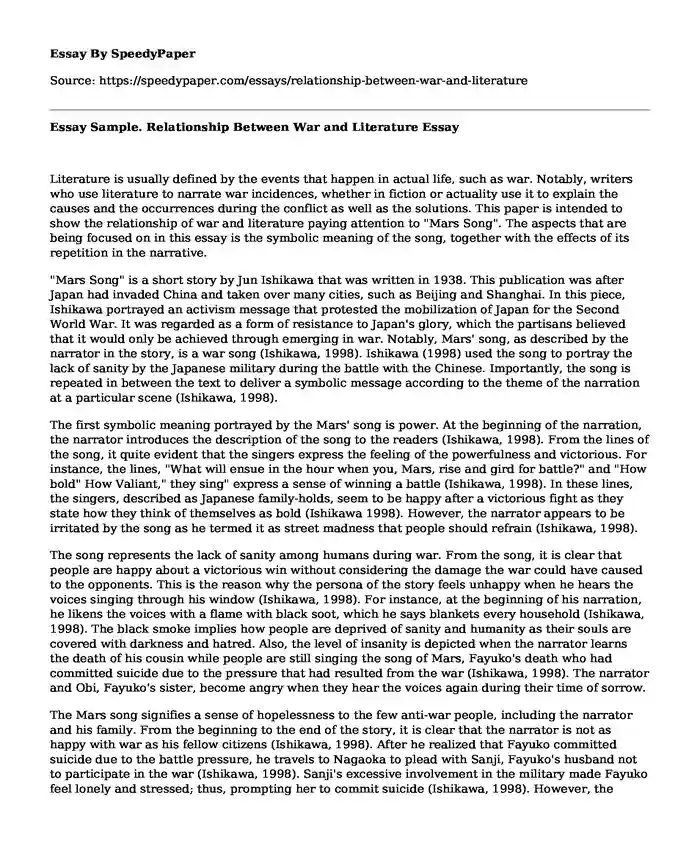
| Type of paper: | Essay |
| Categories: | World War 2 Books Writers |
| Pages: | 3 |
| Wordcount: | 804 words |
Literature is usually defined by the events that happen in actual life, such as war. Notably, writers who use literature to narrate war incidences, whether in fiction or actuality use it to explain the causes and the occurrences during the conflict as well as the solutions. This paper is intended to show the relationship of war and literature paying attention to "Mars Song". The aspects that are being focused on in this essay is the symbolic meaning of the song, together with the effects of its repetition in the narrative.
"Mars Song" is a short story by Jun Ishikawa that was written in 1938. This publication was after Japan had invaded China and taken over many cities, such as Beijing and Shanghai. In this piece, Ishikawa portrayed an activism message that protested the mobilization of Japan for the Second World War. It was regarded as a form of resistance to Japan's glory, which the partisans believed that it would only be achieved through emerging in war. Notably, Mars' song, as described by the narrator in the story, is a war song (Ishikawa, 1998). Ishikawa (1998) used the song to portray the lack of sanity by the Japanese military during the battle with the Chinese. Importantly, the song is repeated in between the text to deliver a symbolic message according to the theme of the narration at a particular scene (Ishikawa, 1998).
The first symbolic meaning portrayed by the Mars' song is power. At the beginning of the narration, the narrator introduces the description of the song to the readers (Ishikawa, 1998). From the lines of the song, it quite evident that the singers express the feeling of the powerfulness and victorious. For instance, the lines, "What will ensue in the hour when you, Mars, rise and gird for battle?" and "How bold" How Valiant," they sing" express a sense of winning a battle (Ishikawa, 1998). In these lines, the singers, described as Japanese family-holds, seem to be happy after a victorious fight as they state how they think of themselves as bold (Ishikawa 1998). However, the narrator appears to be irritated by the song as he termed it as street madness that people should refrain (Ishikawa, 1998).
The song represents the lack of sanity among humans during war. From the song, it is clear that people are happy about a victorious win without considering the damage the war could have caused to the opponents. This is the reason why the persona of the story feels unhappy when he hears the voices singing through his window (Ishikawa, 1998). For instance, at the beginning of his narration, he likens the voices with a flame with black soot, which he says blankets every household (Ishikawa, 1998). The black smoke implies how people are deprived of sanity and humanity as their souls are covered with darkness and hatred. Also, the level of insanity is depicted when the narrator learns the death of his cousin while people are still singing the song of Mars, Fayuko's death who had committed suicide due to the pressure that had resulted from the war (Ishikawa, 1998). The narrator and Obi, Fayuko's sister, become angry when they hear the voices again during their time of sorrow.
The Mars song signifies a sense of hopelessness to the few anti-war people, including the narrator and his family. From the beginning to the end of the story, it is clear that the narrator is not as happy with war as his fellow citizens (Ishikawa, 1998). After he realized that Fayuko committed suicide due to the battle pressure, he travels to Nagaoka to plead with Sanji, Fayuko's husband not to participate in the war (Ishikawa, 1998). Sanji's excessive involvement in the military made Fayuko feel lonely and stressed; thus, prompting her to commit suicide (Ishikawa, 1998). However, the narrator's optimism to save Sanji died when he heard people singing the war song on the train which he had boarded.
It is important to note that the song is occasionally repeated in the text. The effect of the repetition primarily concerns the emphasis of the author's message to the readers. The narrator is vividly irritated by the song throughout the narration and the fact that people are singing it happily. The song is mentioned after the narrator has told a sad story to show how battles are more of harm than victory. Again, the narrator's mood and attitude toward the song is negative as it appears only when he is narrating a sad experience.
In conclusion, Ishikawa's "Mars Song" represents the relationship between war and literature. The song in the text enables the author to express his stance regarding war as it symbolizes different aspects that concern it. Again, it allows him to convince the readers to adopt his idea.
Reference
Ishikawa, J., (1998). The Legend of God and Other Stories (Tyler W., Trans.). Honolulu, the University of Hawaii Press. (Original work published in 1938)
Cite this page
Essay Sample. Relationship Between War and Literature. (2023, Jan 18). Retrieved from https://speedypaper.net/essays/relationship-between-war-and-literature
Request Removal
If you are the original author of this essay and no longer wish to have it published on the SpeedyPaper website, please click below to request its removal:
- Essay Example Describing HSBC's Performance in the Middle East
- Different Views of Art - Free Essay
- Prejudice: Negative Evaluation of Others Based on Group Membership. Essay Example
- Essay Example on Building Sales Team
- Essay Sample on Uber Kalanick Temporary Leave of Absence
- Paper Example. Rearranging the Room
- Free Essay. Importance of Using Scientific Method in the Process of Behavioral Evidence Analysis
Popular categories




